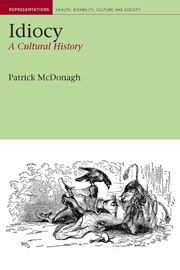Book contents
- Frontmatter
- Contents
- Preface and acknowledgements
- 1 Introduction: idiocy, culture and human relations
- 2 ‘Stripping our own hearts naked’: William Wordsworth and John Wilson read ‘The Idiot Boy’
- 3 A ‘pupil of innocent Nature!’ The wild boy of Aveyron goes to Paris
- 4 Diminished men: masculinity and idiocy
- 5 Essential women: femininity and idiocy
- 6 Holy fools, witty fools, depraved fools: folly, innocence and sin
- 7 History, society, economy: holy fools and idiots come home in nineteenth-century literature
- 8 Barnaby Rudge, idiocy and paternalism: assisting the ‘poor idiot’
- 9 Innocence, philanthropy and economics: the new ‘asylum’ idiot
- 10 Sensational idiocy
- 11 ‘The sins of the fathers’: idiocy, evolution and degeneration
- 12 Danger and degeneracy: the threat of the urban idiot
- 13 The problem of the feeble-minded: the Royal Commission, eugenics and eternal chaos
- Epilogue
- Bibliography
- Index
6 - Holy fools, witty fools, depraved fools: folly, innocence and sin
- Frontmatter
- Contents
- Preface and acknowledgements
- 1 Introduction: idiocy, culture and human relations
- 2 ‘Stripping our own hearts naked’: William Wordsworth and John Wilson read ‘The Idiot Boy’
- 3 A ‘pupil of innocent Nature!’ The wild boy of Aveyron goes to Paris
- 4 Diminished men: masculinity and idiocy
- 5 Essential women: femininity and idiocy
- 6 Holy fools, witty fools, depraved fools: folly, innocence and sin
- 7 History, society, economy: holy fools and idiots come home in nineteenth-century literature
- 8 Barnaby Rudge, idiocy and paternalism: assisting the ‘poor idiot’
- 9 Innocence, philanthropy and economics: the new ‘asylum’ idiot
- 10 Sensational idiocy
- 11 ‘The sins of the fathers’: idiocy, evolution and degeneration
- 12 Danger and degeneracy: the threat of the urban idiot
- 13 The problem of the feeble-minded: the Royal Commission, eugenics and eternal chaos
- Epilogue
- Bibliography
- Index
Summary
‘Doesn't the happiest group of people comprise those popularly called idiots, fools, nitwits, simpletons, all splendid names to my way of thinking?’ demands Stultitia, the goddess Folly, midway through Eramus's Moriae Encomium, or Praise of Folly (Erasum 1511: 116). Not only are they freed from both the mundane and the spiritual crises facing others but also, as she observes, ‘if they come still closer to dumb animals in their lack of reasoning power, the theologians tell us they can't even sin.… They are indeed under the protection of the gods, and most of all, under mine; and for this reason they are rightly held in honour by all’ (117). Furthermore, she claims, ‘They're the only ones who speak frankly and tell the truth’, which has a ‘genuine power to please if it manages not to give offence, but this is something the gods have granted only to fools’ (118–19). Earlier, she argues that folly is distinguished by an attachment to emotion rather than to reason: ‘this is what marks the wise man off from the fool: he is ruled by reason, and the fool by his emotions. That is why the Stoics segregate all passions from the wise man, as if they were diseases’ (105–6). Not surprisingly, the boundaries dividing the wise from the foolish are porous and shift with context: ‘Nothing is so foolish as mistimed wisdom, and nothing less sensible than misplaced sense’ (105), Stultitia argues, while ‘to play the fool in season is the height of reason’ (186).
- Type
- Chapter
- Information
- IdiocyA Cultural History, pp. 129 - 151Publisher: Liverpool University PressPrint publication year: 2008

